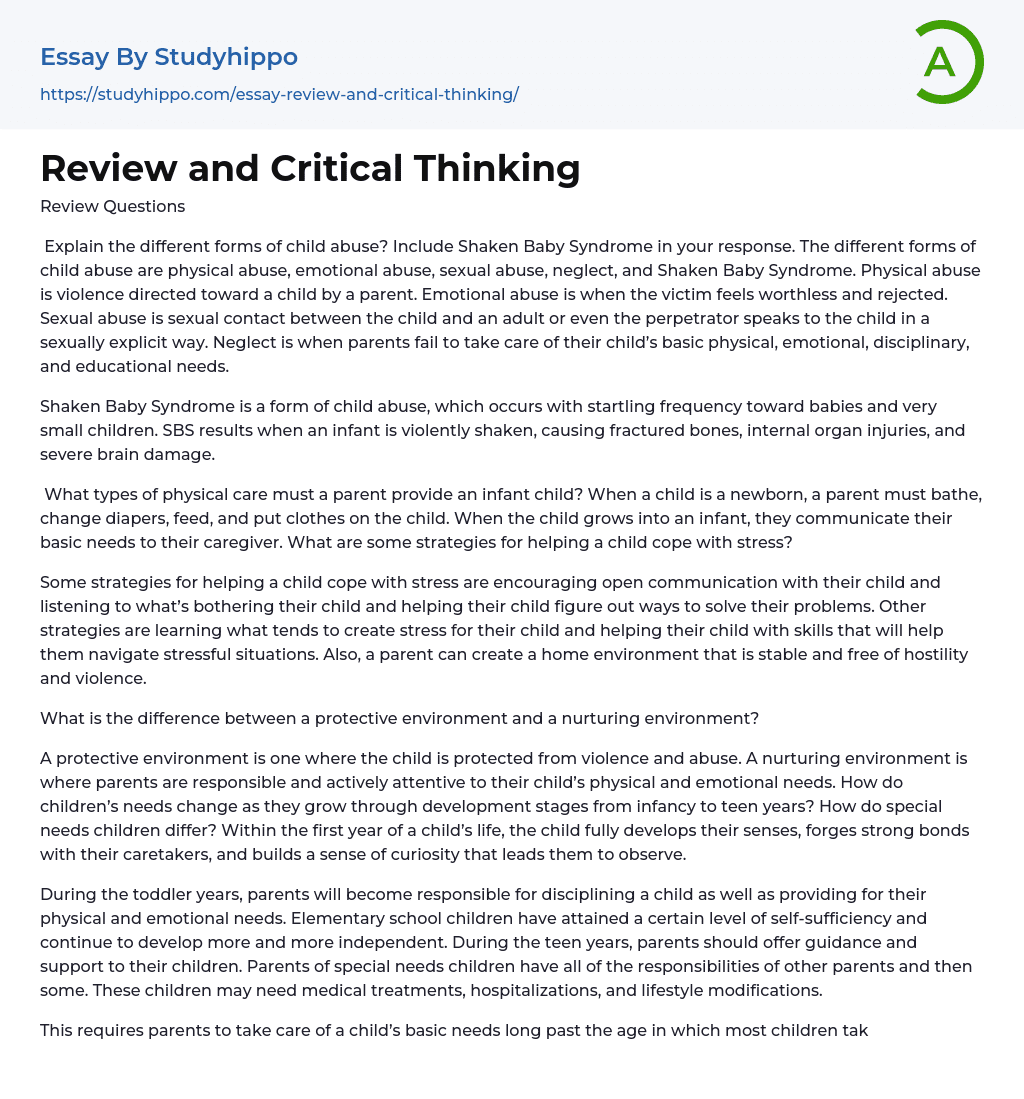The following text contains review questions.
This explanation addresses the different types of child abuse, including Shaken Baby Syndrome. The forms encompass physical abuse, emotional abuse, sexual abuse, neglect, and Shaken Baby Syndrome. Physical abuse refers to a parent's violent actions towards their child. Emotional abuse occurs when the victim feels worthless and rejected. Sexual abuse involves inappropriate sexual contact or explicit conversations between an adult and a child. Neglect arises from parents failing to meet their child's basic needs for physical care, emotional support, discipline, and education.
Shaken Baby Syndrome is a common form of child abuse that primarily affects infants and young children. This type of abuse occurs when an infant is forcefully shaken, leading to fractures, internal organ injuries, and significant brain damage.
A parent is responsibl
...e for the physical care of an infant child, including activities like bathing, diaper-changing, feeding, and clothing. As the child enters the infant stage, they can express their basic needs to their caregiver. Moreover, what techniques can be employed to aid a child in coping with stress?
To support a child's ability to manage stress, it is beneficial to promote open communication and actively listen to their worries. Moreover, assisting them in problem-solving and teaching techniques for handling stressful situations can be advantageous. Another strategy parents can employ is establishing a stable and non-violent household environment.
The difference between a protective environment and a nurturing environment is in how they promote growth and well-being.
As children grow, their requirements change. In a safe environment, they are protected from harm, while parents in a caring setting address their child's
physical and emotional needs. Nevertheless, children with special needs may have distinct requirements. During the initial year of life, children develop their senses fully, form close connections with caregivers, and foster a sense of curiosity to explore the world around them.
Parents have different responsibilities during the various stages of childhood. In the toddler years, they must discipline and attend to their child's physical and emotional needs. As children progress into elementary school, they become more self-reliant but still rely on their parents. Throughout the teenage years, parents should offer guidance and assistance. However, parents of special needs children face extra challenges as they need to administer medical treatments, arrange hospitalization, and make lifestyle modifications to accommodate their child's unique requirements.
Parents have the responsibility of meeting their child's basic needs and creating a nurturing environment, which includes controlling certain factors and exhibiting specific characteristics. This is crucial for ensuring the child's physical and emotional well-being, safety, and protection from harm. When parents fulfill these responsibilities, it fosters a sense of love and trust in the family's ability to provide care.
It is important for family members to dedicate meaningful time to the child in order for them to feel accepted and comfortable expressing themselves without feeling ashamed or guilty. There are various factors that can contribute to unhealthy relationships and raise the chances of child abuse, such as latchkey children being left unsupervised at home, marital conflicts and divorce, substance abuse, HIV/AIDS, and death.
Children experience significant stress when growing up in households where parents frequently argue and display hostility towards each other. Substance abuse, including drug and alcohol consumption,
can hinder a parent's ability to be responsible and nurturing while also impacting their self-control. HIV/AIDS is transmitted through sexual activities, putting both parents at risk and potentially leaving the child susceptible to losing them due to the disease. Dealing with the loss of loved ones is one of life's toughest experiences, and there are no measures that can protect children from this painful ordeal.
Parents are crucial in their children's education as gaining knowledge is significant. They aid in fostering early academic abilities in young children through activities like reading books or aiding them in learning the ABCs and numbers. As kids enter school, parents should maintain communication with teachers and monitor their development. For older children, it becomes imperative for parents to concentrate on imparting independent study skills.
- Abuse Support essays
- Alcohol Abuse essays
- Child Abuse essays
- Physical Abuse essays
- Sexual Abuse essays
- Substance Abuse essays
- Coaching essays
- Critical Thinking essays
- homework essays
- Learning essays
- Library essays
- Listening essays
- Literacy essays
- Mentor essays
- Physical Education essays
- Project essays
- Reading essays
- Research essays
- Sex Education essays
- Social Studies essays
- Standardized Testing essays
- Study Plan essays
- Teaching essays
- Adolescence essays
- Childhood essays
- Growth Mindset essays
- Individual essays
- Infant essays
- Is Google Making Us Stupid essays




